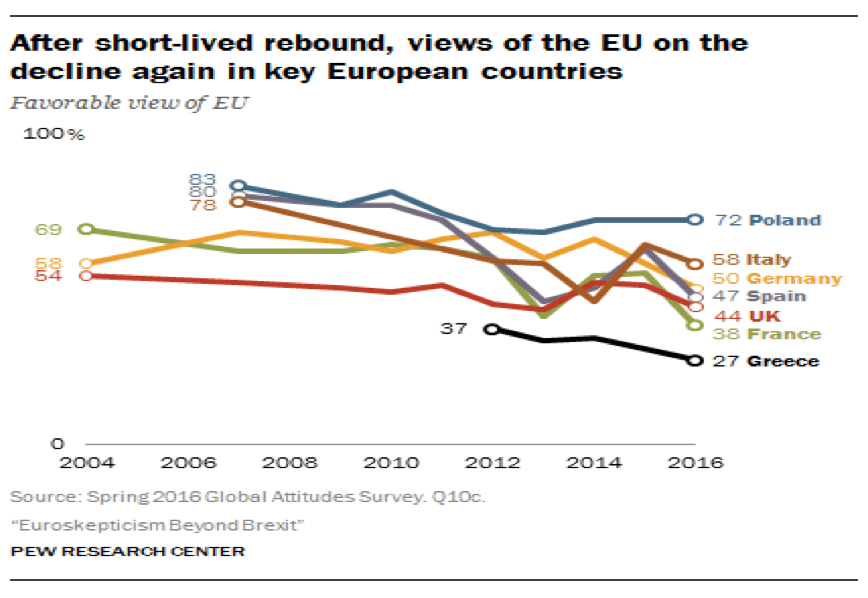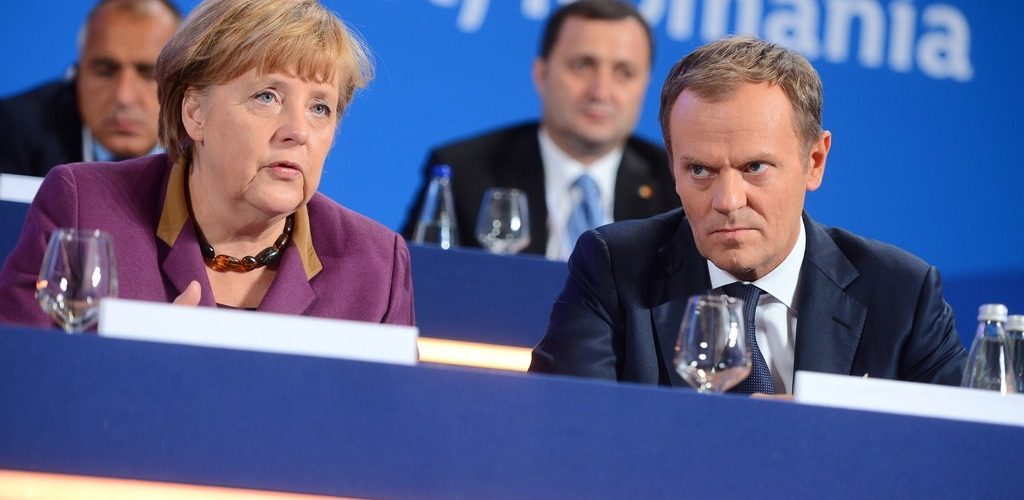Has the European Union lost its appeal? Against a backdrop of unparalleled threats to the stability of the EU – the migrant crisis, radicalized Islam, financing of extremist groups, cyber attacks, Putin and the Russian march toward Eastern Europe – is there any way to avoid a disintegration of the EU or is it merely geopolitical weakness. Is it too little, too late?
For the first time in the EU’s history, a member state voted to leave. The United Kingdom pulled the trigger to exit the European Union. The reality is not as simple as that, however. There are concerns that the Brexit talks could be very complex, lengthy and challenging. Britain will need to negotiate its EU exit, its future relationship with the EU and new trade agreements with the EU and the rest of the world. But Brexit may have opened the door for other countries making their own exits from the EU.
A Pew Research Center Attitudes Survey in Spring 2016 reflects the EU’s image and stature has been on a roller coaster ride in recent years. There is a sharp dip in public support in some of the largest member states as shown in the graph below.

As the EU prepares to mark its 60th anniversary in Rome Italy on March 25, 2017, the European Commission in a press release published its White Paper on the Future of Europe. The White Paper sets out the main challenges and opportunities for Europe in the coming decade. It presents five scenarios for how the Union could evolve by 2025 depending on how it chooses to respond. The five scenarios for the EU by 2025 are: 1) carrying on; 2) nothing but the single market; 3) those who want more do more; 4) doing less more efficiently; and, 5) doing much more together.
Reading the actual White Paper that explains the five scenarios in further detail, one comes to realize, it is clear that status quo remains firmly in place. The EU is not addressing anything relevant. Open borders, terrorism, immigration, security or the sustainability of the EU itself are all are painfully absent in the White Paper, which does not bode well for a bright future.
What is so obviously missing is a global perspective. Europe may share cultural aspects, but European nations are not alike which is why the EU has gone from crises to crises. The why of the European Union, its raison d’être, (reason for being) has been lost.
EU President Donald Tusk wrote a letter to 27 EU heads of state listing Donald Trump as a threat along with communist China, dictatorial Russia, and murderous radical Islam. He stated, “An increasingly, let us call it, assertive China, especially on the seas, Russia’s aggressive policy towards Ukraine and its neighbours, wars, terror and anarchy in the Middle East and in Africa, with radical Islam playing a major role, as well as worrying declarations by the new American administration all make our future highly unpredictable.”
Tusk went on to describe the United States under President Trump’s leadership as the most difficult challenge for the EU, “Particularly the change in Washington puts the European Union in a difficult situation; with the new administration seeming to put into question the last 70 years of American foreign policy.”
Perhaps EU President Tusk is paying more attention to rumor and innuendo than the facts. Vice President Pence said, “President Donald Trump is strongly committed to working with the European Union.” Mr. Pence reassured European leaders about President Trump’s foreign policy direction.
Europe is different things to different people and different nations. For continental Europeans, it is at once a geographical, historical and cultural home. Now, six more countries want to hold referendums to exit the EU; France, the Netherlands, Italy, Austria, Finland, and Hungary all could leave.
At this point, reaching a consensus on a path forward has become all but impossible for the European Union’s members. To knit themselves even closer together, EU states would have to compromise on issues that are too important to budge on. The alternative option — reversing European integration — is gaining ground, but it comes with the very real possibility of leading to the bloc’s complete dismantling. Members could take a middle road of sorts by choosing to keep things as they are, but even inaction would come at a price, promising even greater problems for the troubled bloc down the line.
In the end, partners of convenience do not make strong allies.
Dr. Katherine (Kat) Harris is an OpsLens contributor, a veteran spouse, expat, and former military contractor with over 20 years of expertise in military/family transition, career counseling, higher education, organizational strategic planning, and international relations. She has conducted seminars and workshops for many Department of Army commands, plus many non-profit and community associations. She served as a translator and liaison for American, British, French, and German civilian/military communities in Berlin and Helmstedt, Germany.
Academically, Dr. Harris holds a Bachelor of Science in Management Studies from The University of Maryland European Division, a Master of Arts in International Relations from Boston University, and a Doctorate in Education from Rowan University with an emphasis in leadership and higher education in a global context.

















